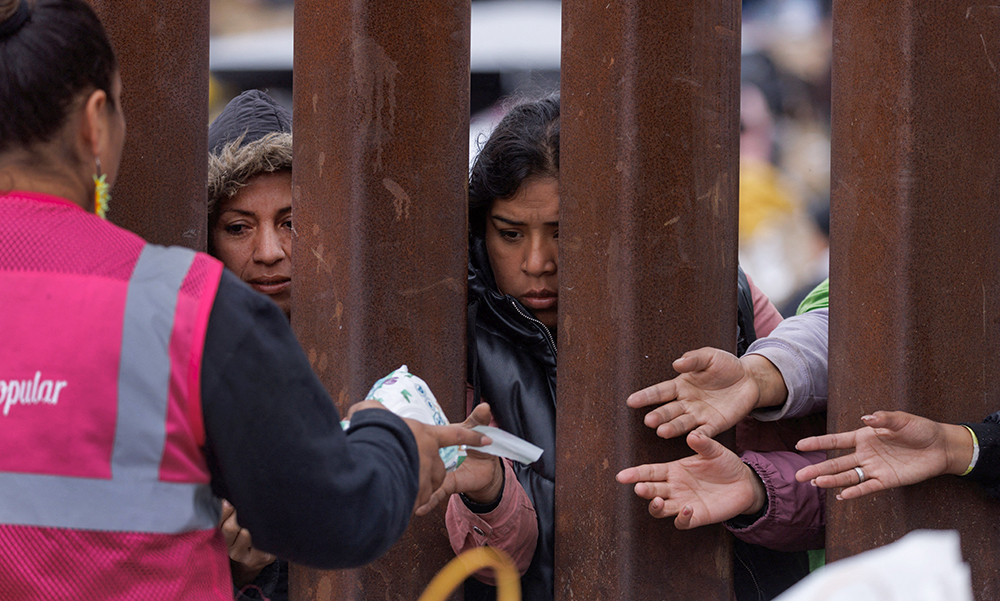
WASHINGTON — The day after Title 42 expired, lifting pandemic public health restrictions that had limited border crossings into the United States, a group of bishops along the southwest U.S.-Mexico border said they “remain committed” to the Church’s efforts to welcome migrants.
In a May 12 statement, they said they support efforts in their dioceses and beyond that “promote the God-given dignity of every person, including those who have recently arrived in our communities.”
The bishops also added that in providing humanitarian aid, they would always cooperate with local, state, and federal officials, “frequently in partnership with faith communities and like-minded secular organizations.”
Although the border had not experienced the surge of migrants that had been anticipated once this federal policy was lifted, officials have been saying they do not know the numbers that will cross in upcoming days or weeks.
Amid this time of uncertainty, the bishops acknowledged both the blessings and challenges of migration, saying they see this every day as pastors of border communities where they “minister to migrants and native-born persons alike.
“Our congregations include asylum-seekers, enforcement officers, landowners, and elected officials, who come together, not as strangers or adversaries but as sisters and brothers, equal in dignity and worth before the Lord,” they said.
The bishops also stressed that Catholics in the United States have always “been at the forefront of efforts to welcome newcomers of all faiths and nationalities.”
They said Christians are “called to see the face of Christ in those who suffer, those who lack the basic necessities of life,” and will be judged as a community of faith “by the way we treat the most vulnerable among us. We are each bound by a universal call to serve one another and to protect the sanctity of human life in all its forms.”
The bishops ended their statement with a prayer to Our Lady of Guadalupe that Catholics would be “blessed with a humanitarian heart that beats with fraternal compassion for those in need.”
The statement was issued by Cardinal Robert McElroy of San Diego; Archbishop Gustavo García-Siller of San Antonio; and Bishops Peter Baldacchino of Las Cruces, New Mexico; and Edward Weisenburger of Tucson, Arizona; along with Texas Bishops Daniel Flores of Brownsville; Mark Seitz of El Paso; Michael Sis of San Angelo; and James Tamayo of Laredo. Bishop Seitz also currently serves as chairman of the U.S. Conference of Catholic Bishop’s Committee on Migration.
Catholic immigration groups have also spoken up about Title 42’s expiration and warned about the federal government’s return to a section of the U.S. code known as Title 8 that allows migrants to seek asylum but can be a long and drawn-out process.
Homeland Security Secretary Alejandro Mayorkas has said Title 8 could have “more severe” consequences for migrants found to be entering the country illegally.
Dylan Corbett, executive director of Hope Border Institute, a faith-based group working on the U.S.-Mexico border, tweeted on May 12 that Title 42 “was wrong. But the Biden admin swapped one bad policy for another, reducing our commitment to asylum rather than putting in place humane, effective measures that long-term will work for migrants, border communities, and the region.”
Catholic Legal Immigration Network, known as Clinic, similarly issued concern for immigration policies that could now go into effect.
Anna Gallagher, Clinic’s executive director, said in a May 11 statement that in the coming days, “as new policies are implemented, and the post-Title 42 landscape unfolds, Clinic will continue to repeat Pope Francis’ words: We are ‘brothers and sisters all.’
“The men, women, and children who come to our borders are made in the image and likeness of God, with equal and untouchable dignity. We know this based on our faith. We will continue to pray and speak out for immigration policies that respect that truth, including the right to seek asylum freely, fairly, and safely,” she added.
